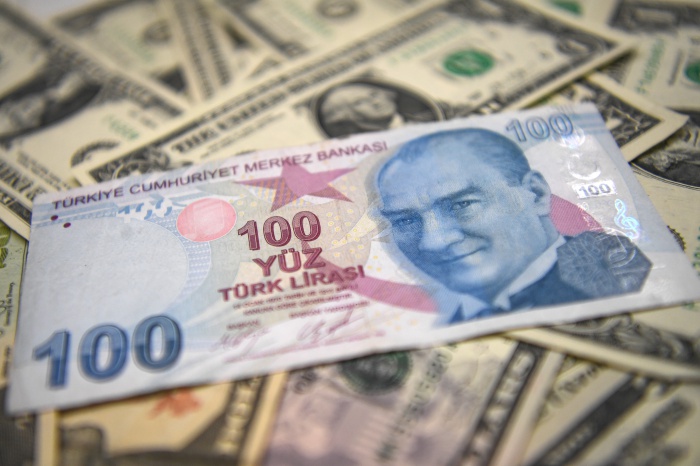Turkey’s lira pulled back from a record low of 7.24 to the dollar on Monday after the central bank pledged to provide liquidity and cut reserve requirements for Turkish banks, but its meltdown continued to rattle global markets, Reuters reported.
The currency has lost more than 40 percent of its value against the dollar this year, largely over worries about President Tayyip Erdoğan’s influence over the economy, his repeated calls for lower interest rates and worsening ties with the United States.
On Friday that relentless slide turned into a crash: The lira dropped as much as 18 percent, hitting US and European stocks as investors took fright over banks’ exposure to Turkey.
The fresh lira collapse on Sunday night hit Asian shares, weakened South Africa’s rand and drove demand in global markets for safe currencies including the dollar, Swiss franc and yen. Shares in Europe’s major banks also lost ground.
The central bank, which surprised markets last month when it left interest rates unchanged despite double-digit inflation and the tumbling lira, announced the moves on liquidity and reserves after Finance Minister Berat Albayrak said authorities would start implementing an economic action plan on Monday.
Bankers also said the central bank would meet banks’ lira liquidity needs at the overnight rate of 19.25 percent — 150 basis points above the benchmark weekly repo rate — though it might not use the overnight funding on Monday because lira liquidity needs were low.
They said the bank’s decision could be the first step towards tightening policy through the use of an interest rate corridor, an instrument used in previous years, rather than an increase in the benchmark rate.
The bank said it cut the lira reserve requirement ratio, a cash buffer held by banks, by 250 basis points for all maturity brackets and lowered reserve requirement ratios for non-core FX liabilities by 400 bps for maturities up to three years.
The moves will free up 10 billion lira, $6 billion (4.7 billion pounds) and $3 billion (2.4 billion pounds) equivalent of gold liquidity in the financial system, the bank said. It also pledged to provide “all the liquidity banks need.”
While the measures should ease worries over financial stability, they will have no direct impact on the lira because they do not affect banks’ foreign exchange positions, BNP Paribas strategist Erkin Isık said in a note.
Isık said the lira’s current levels would add between 4 and 5 percentage points to headline inflation in coming months, pushing it up to around 21 percent in September from nearly 16 percent last month.
On Sunday night Turkey’s banking watchdog, the Banking Regulation and Supervision Agency (BDDK), said it was limiting banks’ foreign exchange swap transactions.
The lira, which hit a record low of 7.24 against the dollar in Asian trading, pared losses after Albayrak’s comments and the central bank announcement, strengthening briefly to 6.4. It was trading at 6.8700 per dollar at 1024 GMT.
Turkish bank shares fell to their lowest level in dollar terms since November 2003, and their dollar bonds and Turkey’s sovereign dollar debt tumbled. Stocks dropped 4 percent, with the BIST index of blue-chip stocks down around 50 percent in dollar terms this year.
Albayrak said in an interview published on Sunday that Turkey would start implementing an economic plan to ease investor concerns, stressing budget discipline and pledging that fiscal rules would be implemented for targeted indicators if necessary.
“We will be taking the necessary steps with our banks and banking watchdog in a speedy manner,” he said, ruling out any seizure or conversion of dollar-denominated bank deposits into lira.
Market analysts broadly welcomed his comments but said investors wanted to see action.
“It’s purely technical, and Turkey needs a complete rebalancing of its economic business plan and very sharp rate hikes and a strong commitment that the central bank will be independent,” Credit Agricole’s senior emerging markets strategist Guillaume Tresca said.
But a drastic rate hike was unlikely because of the damage it would do to Turkey’s corporate sector, while any capital controls would close off access to foreign exchange for companies already short of dollars, Tresca said.
Turkey would also be reluctant to seek assistance from the International Monetary Fund (IMF) after clearing billions of dollars of debt to the fund under Erdogan.
In the interview with the Hürriyet newspaper, Albayrak described the lira’s weakness as “an attack” — echoing Erdoğan, who is his father-in-law.



